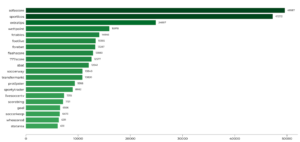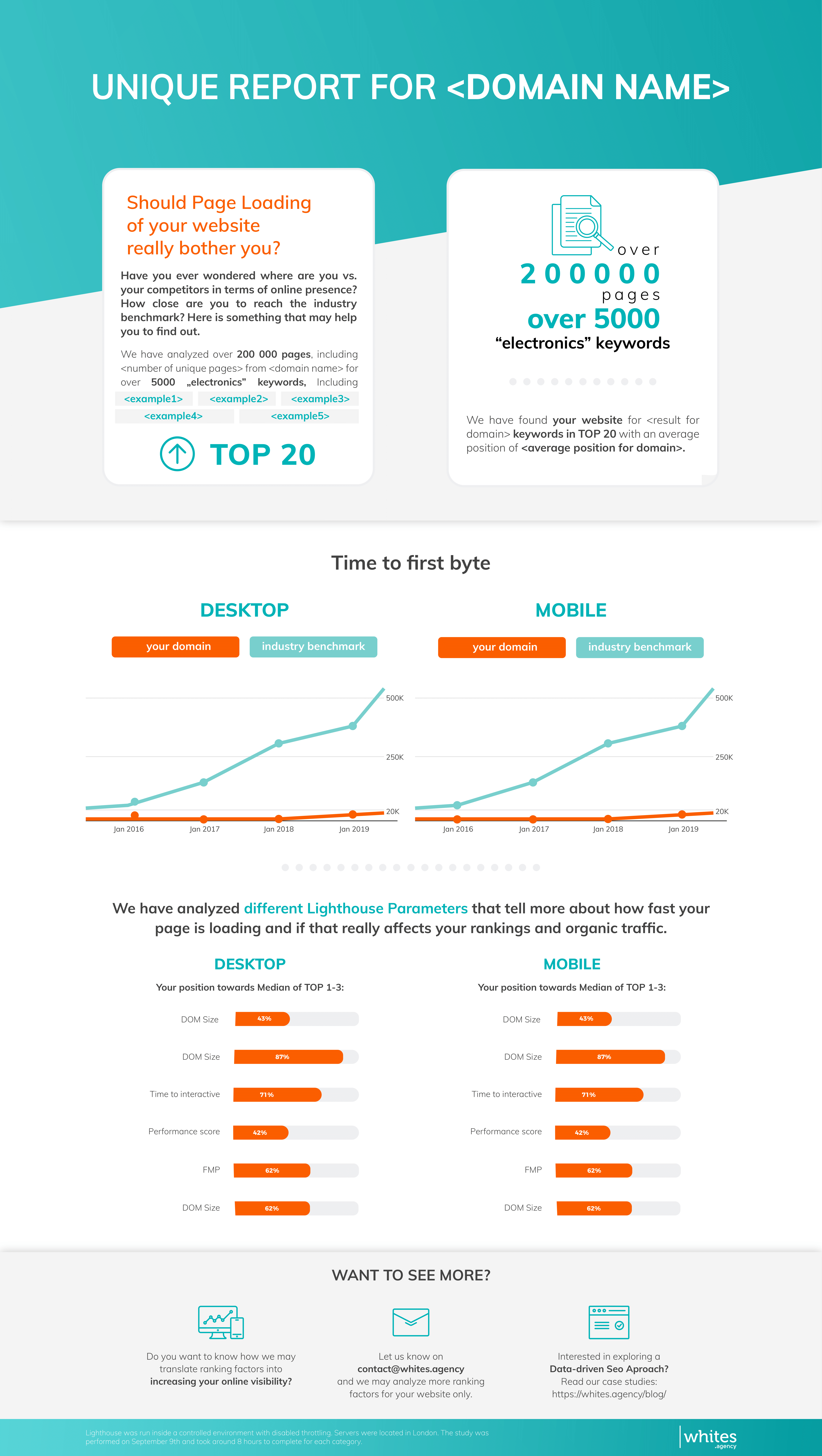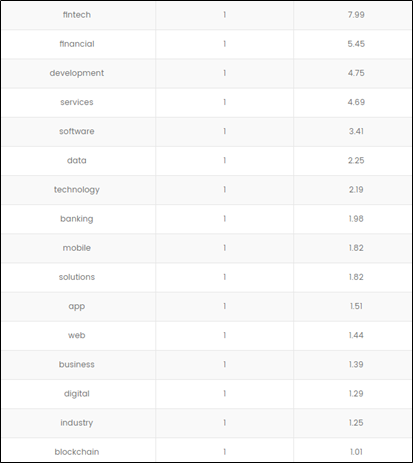Benchmarking in SEO – How to rank better in SERPs with Data-Driven SEO?

Let’s get started
Benchmarking is one of my favorite tools for running a business. I keep analyzing my competitors, both those ahead of us and those smart challengers with great pace of growing a business. And I believe that the SEO elementary should include the following statement – with the right tools and experience you can learn almost 100% of your competitors’ “secret sauce”.
At first, I need to explain what benchmark really means. This term originates from… surveying! Surveyors mark exact points of their measurement, as they have to be sure that the next analysis will be prepared in the same place. This is how the term benchmarking was created – and it means the analysis of our product compared to the competitors’ one.

Don’t be fooled, benchmark doesn’t mean mindless copying of competitors’ solutions. Or shouldn’t mean it. A correctly prepared benchmark will give us crucial information for our business, for example how to avoid competitors’ mistakes and what are the effective solutions to similar problems. Moreover, benchmark enables us to prepare the right strategy by identifying emerging trends, as well as it gives us insight into setting priorities in developing our business.
Benefits of benchmarking for the business
Why do we need a benchmark in SEO? I’m sure it can give us all the benefits mentioned above. Let’s look at the examples:
- What phrases do webpages that have been successful in Google search results include? Example: All webpages with good organic visibility in Google on “Python Frameworks” keyword use words such as “web”, “django”, “development”, “flask”, “library” and “project” in content.
- What thematic niches are not sufficiently served by our competitors? Examples: If our company is able to provide financial audits for the automotive industry, is it worth mentioning in our SEO strategy? Benchmarking will show us if our competitors include information about the given industry on their landing pages. Maybe it’s an interesting niche to cover?
- What thematic associations have our competitors developed over the years? Let’s say that our content platform addresses the topic of healthy lifestyle. According to the benchmark, it is “permitted” to add home recipes that improve immunity to it, as such associations were previously developed by several competing websites.
How to prepare a SEO benchmark for your business? 3 tips
Here are three ideas for preparing a SEO benchmark for your business:
1. Identifying your competitors
Hey, but I know my rivals well enough! – you may think. Yet, it does not necessarily mean that those are the same players you compete with for Google top results.
Let’s have a look at an example from real life. You own a software house that specializes in Symfony (PHP framework). In this case, your SEO competitors are not only other software houses with such focus, but your competitors in Google’s results are also:
- A company that offers programming courses in Symfony.
- Website of the creators of this framework.
- Content publishers who don’t sell this service, but write about its definition or about news regarding Symfony.
- Social Media materials and forums where this topic is discussed.
The aforementioned spread is large which shows that Google is trying to diversify search results so that everyone can find something for themselves. It happens when a user doesn’t provide the search engine algorithm with enough insights about their intentions. For example, when you enter “mechanic” on Google, do you want to read about the movie, hire a mechanic, or maybe you are looking for a job? Depending on the branch, those diversifications are varied because potential customers articulate their needs and sales inquiries in different ways.
So how to discover your SEO competitors? You can simply type some keywords that you believe are relevant to your business and research the results. Alternatively, you may use SEO tools like Ahrefs or Searchmetrics that help you to find out who appears most likely for given keywords.

When we want to have a full perspective on the industry landscape, we employ our internal tool – White Dog – to crawl thousands of SERPs and have a full understanding of visibility in Google in a given industry. Here is an example of our analysis:
A number of occurrences of particular websites in the TOP 10 results:

Moreover, if you are curious about where you are compared to your competitors in terms of online presence, we may prepare a FREE One Pager analysis for your business. From the analysis, you can learn about the speed of your website loading and other important factors that influence your position in SERPs. Contact us and we will send you an email with a customized report.
Here is an example of our One Pager report:

2. Inbound links
Although everything tends to get blurry in the SEO world, there is a consensus among SEO experts that having a lot of high-quality inbound links can be a great help when you try to improve your organic traffic. How to get them? Well, you can always have a look at how your competitors are doing in this matter. With tools like Majestic or Ahrefs, you can investigate their link building and/or baiting tactics.

But how many links is enough in my case? This is a tough one, especially since the cost of links is getting higher and higher. At Whites.agency we gather information about inbound links from thousands of websites from a given industry and compare them to search results. This way we can gain insights regarding the volume and other parameters of inbound links.

The above example (the result of our research), proves an important thing. In SEO strategy a drugstore e-commerce doesn’t need as many backlinks as computer websites. This is because the latter branch is definitely more competitive. What are the conclusions coming from this information? Knowing what the priorities of the optimization process should be. In the aforementioned drugstore, work must, therefore, be moved onto other aspects of SEO activities.
3. Content Optimization
Truly great content will rank well – Google’s representatives claim. But what exactly does it mean? You can start with implementing the reverse engineering approach to those pages that currently rank in top results for a given keyword. What do their authors write about? What aspect do they cover? What keywords do they use? How often? You can verify it manually which can help you grasp the idea. We have used a Big Data approach to look at it from a broader perspective and thanks to insights from this analysis we managed to improve client’s SEO KPIs.
Distribution of the most popular websites for prediction phrases:

Conducting such an analysis will also allow us to write a text ideally optimized for the Google algorithm. Below is an example of how our White Dog tool works for the phrase “fin-tech development”:

The analysis indicates that articles valuable on Google are not able to dispense with such phrases as “development”, “services”, “software” but also “business”, “digital” or “blockchain”.
Summary
At this point, you are aware of the importance of SEO benchmarking for your website. By comparing yourself with your competitors you can determine what factors may have the biggest impact on your position in SERPs. You will be able to prioritize optimization and build a more accurate digital strategy. At the end of the day, it will benefit your business.